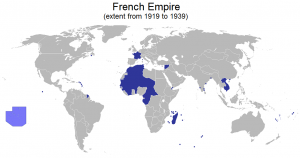Three Differences Between Haitian Creole and Mauritian Creole
By Sarah-Claire Jordan
 Besides the French Creole spoken in Louisiana, Haitian Creole is probably the most well-known French-based creole in the world. It is one of two official languages in Haiti, the other being French. Haitian Creole is based mostly on the French spoken in the 18th century, but also has elements of Portuguese, Taíno (a language indigenous to the Caribbean), Spanish, and of course some West African languages. It developed out of the interactions between settlers from France and the African slaves imported to Haiti.
Besides the French Creole spoken in Louisiana, Haitian Creole is probably the most well-known French-based creole in the world. It is one of two official languages in Haiti, the other being French. Haitian Creole is based mostly on the French spoken in the 18th century, but also has elements of Portuguese, Taíno (a language indigenous to the Caribbean), Spanish, and of course some West African languages. It developed out of the interactions between settlers from France and the African slaves imported to Haiti.
On the other side of the world, in the area of the Indian Ocean, there are other French-based creoles that developed in somewhat similar circumstances, but with some big differences due to the other cultures involved. One good example of this is Mauritian Creole, spoken on the island nation of Mauritius. Other than the fact that it is also based on the French language, Mauritian Creole and Haitian Creole aren’t exactly the same. Here are a few big differences to give you an idea:
1. Status within country
Haitian Creole enjoys a very high status in Haiti, as it is recognized as one of the two official languages of the country, the other being French. It has its own literature, and has since around the 1880s, and is noted as the only language that all Haitians truly have in common. Many newspapers, radio stations, and TV shows are made in Haitian Creole.
Mauritian Creole does not have any official status in Mauritius. It is used as a lingua franca in the country, but French is more widely spoken and socially accepted in the workplace. English is actually the official language of Mauritius, but Mauritian Creole is the most common language spoken in the homes of Mauritius.
2. Orthography
The orthographic system used for Haitian Creole is extremely regular and consistently used for all literature and publications in the language. The process that led to the establishment of the present orthography was very complex and politically charged, however. The Haitian elite thought it shouldn’t be too similar to English, and others were worried it would resemble French too much. In the end, it worked out and is still used to this day.
In Mauritius, there was never an official orthography established for Mauritian Creole. Many dictionaries have been published for the language, but no one orthography ever stuck. In 2011, an orthographic reform was supported by the government, that generally followed French orthography except for the silent letters. Still, there is a variety of orthographies used in the different Mauritian Creole publications.
3. Meanings of French words
In Haitian Creole, most of the lexicon is made up of French words, and though some of them are words that aren’t used by Standard French speakers anymore, for the most part they have the same meaning as the original French.
Mauritian Creole has a tendency to take French words and give them a new meaning, like “gayn”, which comes from the French “gagner” (to earn or win), means “to get” or “to obtain” in Mauritian Creole. This isn’t the case with all French loan words, but it does happen more often than in Haitian Creole.
Creoles continue to be important, as their use helps to preserve the culture of those who speak them. At Alpha Omega Translation, we are well aware of the importance of preserving languages and have team members ready to interpret and translate a variety of creoles, whether they are French-based or otherwise.
Category: Foreign Language








